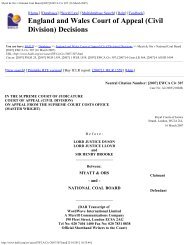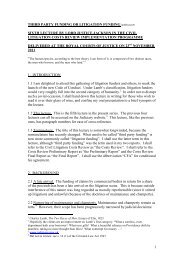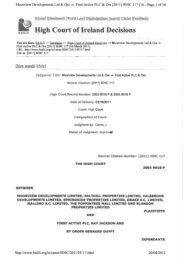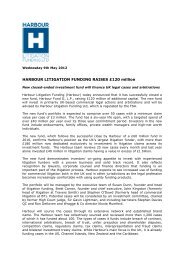[2013] SGHC 135 - Singapore Law Watch
[2013] SGHC 135 - Singapore Law Watch
[2013] SGHC 135 - Singapore Law Watch
You also want an ePaper? Increase the reach of your titles
YUMPU automatically turns print PDFs into web optimized ePapers that Google loves.
<strong>Law</strong> Society of <strong>Singapore</strong> v Kurubalan s/o Manickam Rengaraju [<strong>2013</strong>] <strong>SGHC</strong> <strong>135</strong><br />
52 The second aggravating factor was that when the Complainant resisted<br />
paying the Respondent the share of the Settlement Sum to which he had laid<br />
claim, the Respondent did not acknowledge his mistake or even pause for<br />
reflection, much less retreat and come to his senses. Instead he responded<br />
aggressively (see [14] to [16] and [25(c)] above) and in the process aggravated<br />
his initial breach. We do not propose to repeat what we have already set out<br />
above, save to observe that the Respondent threatened civil proceedings 19 and<br />
even hinted that criminal charges could be brought (see [16(c)] and [25(c)(v)]<br />
above). We pause to note that this by itself might have amounted to<br />
professional misconduct: see <strong>Law</strong> Society of <strong>Singapore</strong> v Terence Tan Bian<br />
Chye [2007] SGDSC 10. In our view, even if these further actions did not<br />
warrant separate misconduct charges, they were at the very least unbecoming<br />
of an Advocate and Solicitor and wholly unacceptable in the context of a<br />
solicitor dealing with his client. They illustrate some of the reasons why<br />
champerty can be an obnoxious and unacceptable practice without careful<br />
limits being drawn. The evil lies in the temptation facing Advocates and<br />
Solicitors who enter into such agreements to descend into wholly<br />
inappropriate and unprofessional conduct in order to protect their own interest<br />
in windfall gains. This was evident in the Respondent’s conduct in this case.<br />
53 The <strong>Law</strong> Society initially made reference to cases of overcharging and<br />
touting and suggested that these provided appropriate reference points for the<br />
purposes of sentencing because the Respondent stood to gain A$1,200,000<br />
which was at least ten times what he could have charged for his fees based on<br />
the bill of costs that was rendered, which itself seemed on the high side. In<br />
oral submissions, Mr Philip Fong sensibly did not press this argument.<br />
19<br />
RP vol 6 p 1265–1266 (ASOF, paras 18–24)<br />
29


![[2013] SGHC 135 - Singapore Law Watch](https://img.yumpu.com/37488807/29/500x640/2013-sghc-135-singapore-law-watch.jpg)
![Neutral Citation Number: [2010] EWHC 941 (QB) - Harbour ...](https://img.yumpu.com/47188668/1/190x245/neutral-citation-number-2010-ewhc-941-qb-harbour-.jpg?quality=85)
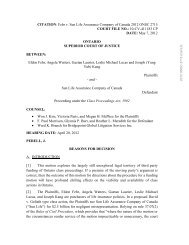
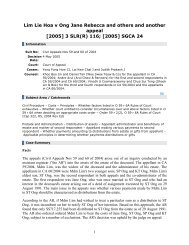
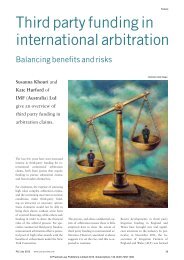
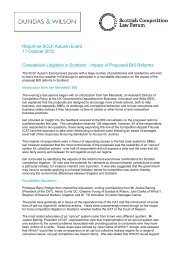
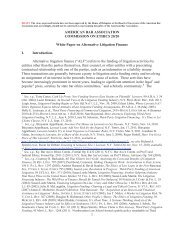

![Hall v Poolman [2009] - Harbour Litigation Funding](https://img.yumpu.com/37488843/1/190x245/hall-v-poolman-2009-harbour-litigation-funding.jpg?quality=85)
